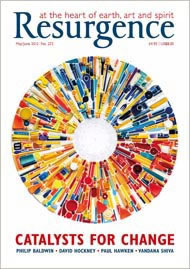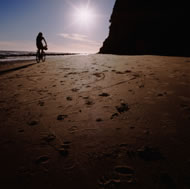There are a few principles that can help you on your way to really appreciating of the joys of zycling:
1. There must be no sense of urgency
So, as you cycle along mostly traffic-free routes or very minor roads, even though you may have considered some kind of destination (e.g. camp-site, staying with people, a city or town even a railway station), try to avoid the tendency to constantly check the time or the distance to your destination. Your destination is really often a place that you didn't anticipate when you started. Once I was visiting my meditation group which was quite a distance, and I was hoping to put the folder in someone's car for the return trip, but the car was full. The host offered me a bed for the night. At first I declined, as I hadn't anticipated staying over, but I didn’t really need to go home for the night – so I accepted. As someone who often needs to be in control, this felt really good for me.
2. Leave the radio, music players, cell-phones and (if you can) your watch at home
What we are trying to create is a sense of being in the now. This requires as little outside stimulation as is possible. One then notices one's habitual tendencies and those familiar distractions. So one's attention begins to focus on the slowly passing surroundings, bird sound, smell of the crops, changing temperature, and the silence that you suddenly become aware of, the muscular effort of going uphill and the exhilaration down the other side with the relaxing feeling in the legs.
I must confess, once when cycling along a bike trail in Washington with the cascades on my left and the Skagit river on the right, I switched on the tranny and the Garrison Keilllor show on PBS came on – which completed this ideal American scene.
3. Staying silent during parts of the day
When I'm not cycling, I find myself being over-sociable, and generating too much interest and excitement. But on the bike the need to chat falls away as I focus on those points in precept 2. A passing wave or smile is all that's necessary.
4. Responding to and befriending your surroundings
This is the contrast to precept 3. The idea is not to keep silent with a vengeance, but to retain a degree of conviviality. So if someone shows interest in your equipment or wonders where you're from, be open and friendly. If you meet a poet along the track (this happened to me), stop and listen to his stanzas even if the lines don't quite scan (his did). If you hear a song in your head, feel free to sing out loud (as you won't always be cycling in a group, nobody will mind). In fact, work towards letting go of the group and experience the feeling of being completely alone in a foreign land.
5. Recognising and handling fear
This is the big one. As soon as we are away from our comfort zone, we experience a form of fear which often drives us back to a position of the familiar. Now if you're travelling in Canada and you spot a bear up ahead, it's probably wise to stop and retire slowly to a safe distance. Or if you’re in the depths of winter and you see a storm bearing down, then it's wise to take shelter. These are real fears. What isn't helpful is the worrying fear of getting somewhere late because you may have to find somewhere to camp where you haven't planned. Just let go and a suitable place will turn up. On finding out that you've taken a wrong turning, don't fret but instead explore the unexpected and eventually the map will take care of things. If not, a passer-by comes to the rescue and you can experience that lovely feeling of being looked after. Now we are entering the area of serendipity, where fear starts to drop away and you experience the reality where the self isn't always in control.
Another fear producing experience is listening to others, with comments like, "can we do this?” or "they won't allow that". This is often a projection of someone's own fear. For example, I often free camp: on the Danube cycle path I found a clearing in the forest and put my tent up near a trailer. Just as I was falling asleep the farmer drove in and told me it was forbidden to camp and pointed out that the trailer was a mobile beehive. I reassured him in my most polite English that I would leave first thing before the sun warmed up and the bees became active. He seemed happy with that and left.
By the same token, it's sometimes better to be open. Once in Tuscany I saw a clump of trees by a field up a farm track. As I was putting the tent up a boy cycled up from the farm and said something in Italian which with my almost zero languages, wasn't able to understand. He returned with dad who wanted me to join them for supper and sleep in the farmhouse. I felt so silly having crept by their property. What is important is your intention. After a while, when you feel physically fit, you will be able to take what you would have considered risks physically and mentally. That is the learning experience.
6. Handling competition
This is a strange one as we are so brainwashed into achieving. Questions like: "How many miles have you done today?” "How long did it take to get up the mountain – did you walk?" or "What! You put the bike on a train!" "I must have the state-of-the-art machine and equipment." (The world-renowned writer and cyclist Dervla Murphy used a three-speed sit up Hercules on her trip to Afghanistan). By all means have a serviceable and roadworthy bike, but if the going's too steep, get off and walk, experience the land by foot and work another set of muscles. "I must keep up with that good-looking rider, can't let them think I'm a wimp". If you pass by an interesting feature and your inner guide says stop and have a look, it's so important to acknowledge and respond to that voice. (For more on this, see "LISTENING" by Lee Coit ISBN 0-936 475-00-5)
7. On being assertive
This is important when cycling on ordinary roads, but on many routes you are able to forget the busy world and manic cars. Eurovelo6 en.eurovelo6.org/ a 2,485-mile bicycle road is one example – an amazing mostly traffic free route from the Atlantic at St. Nazaire, France to the Black Sea, Romania. The EuroVelo 6 is one of 12 routes network EuroVelo born at the initiative of the European Cyclists' Federation (ECF) in 1994. Its objective is to follow three of the largest European rivers: the Loire, Rhine and Danube. Watch out for the Lycra-clad 'Furters being more than frank with cries of "ACHTUNG" on the Danube section in Germany.
Every four or five days, leave the bike alone, and, if you can, stay with the locals. That makes it easier, as you can then enter their world. Even if they don't adventure-cycle, they probably have other interest and passions. (I belong to SERVASBRITAIN.ORG, which is a wonderful way to meet people.)
8. Have an adventure by yourself
So, finally we arrive at another biggy – going away by yourself. Not having someone to share that wonderful market, or spectacular view. But don't worry – there will be moments when you meet up with others to share the adventure, and you won't fall into the trap of using your companion as a protection. But, you will have to interact with strangers if need be, out of delightful interest.
Conclusion
Looking over these musings, they do seem rather directive. Please remember, these are only ideas and my experiences. The important thing is to have your own unique moments. As I get older, I often travel with a folding bike, as it's easier to get on the train and bus. Whatever you buy, get the best that you can afford. And finally, one of my more eccentric habits is to stop and pick up stuff on the trail. I still have an umbrella from several years ago and a lamb's wool sweater that after a wash was as good as new. This takes off the pain of losing one's own stuff.
Before you venture abroad try some Sustrans routes. You’ll find information on the Sustans website: www.sustrans.org.uk/. You might also enjoy Land's End to John O'Groats: The Great British Bike Adventure by Phil Horsley – a must for any warm-blooded peddler. For visiting Intentional Communities and Ecovillages in Europe see EUROTOPIA.DE ISBN 3-00-007080-x. I recommend the L'Arche communities inspired by Gandhi. For those not adverse to North America and are particularly fearless try: Cycling the Great Divide by Michael McCoy ISBN 0-89886 698-7 Mountaineers Books.org. I haven't done this route yet – but I still dream that one. Do take an AMTRAK Visit USA Month Pass, it's easier with a folder in a bag and have the ride of your life. Meet Americans as nice as apple pie and stations like palaces. LA's Union Station is an Art Deco gem. Do take a couple of days out in Tucson Arizona and cycle up Mount Lemon – 25 miles of steady climb from 2,000 feet to 9,000 feet and back to the Señora Desert with it's amazing cactus, and don't miss Savannah Georgia (fortunately General Sherman did, thank god, it's a Colonial gem). Enjoy and have a nice day.







